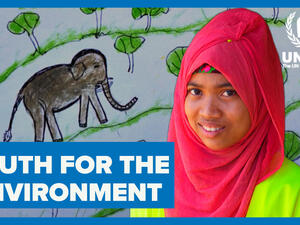UNHCR opens Liberia's first environment centre
UNHCR opens Liberia's first environment centre

Liberian returnees learning how to use energy-saving eco-stoves at the new environment centre in Liberia.
MONROVIA, Liberia, March 16 (UNHCR) - The UN refugee agency has opened the first environment centre in Liberia in a bid to ensure that mass refugee returns do not have a negative impact on an environmental already damaged by 14 years of civil war.
Located at VOA camp on the outskirts of Monrovia, the UNHCR-funded centre aims to show Liberian returnees how to protect and revive the environment.
This knowledge is crucial at a time when tens of thousands of Liberians are coming home after years of exile in the region. Their return has increased the demand for farming land, forest products like timber and poles for rebuilding houses, as well as wood and charcoal for cooking.
"These needs are realistic as they affect the lives of all Liberians on a day-to-day basis," said UNHCR Representative in Liberia, Moses Okello, when he inaugurated the centre earlier this month. "In areas where the environment has been severely degraded, this will bring additional pressure to bear on an already strained environment."
There are also concerns that returnees may start extensive hunting of animals for bush meat or embark on environmentally-harmful activities like gold- and diamond-mining to make a living.
Tommy Garnett, Programme Director of Environmental Foundation for Africa that is conducting the training, appealed to the community to "help inspire the local leadership and environmental action group members, who apart from donating the land, have worked tirelessly and with dedication to transform bare grassland to the first-ever environment centre in Liberia."
Specifically, returnees and their host communities will be shown how to transplant trees in degraded areas and to set up and maintain tree crop plantations and community woodlots. They will also be taught fuel conservation methods and the production, use and possibly sale of energy-efficient devices like eco-stoves.
In addition to training returnees, the centre also guides implementing partner agencies on how to incorporate environmental concerns in their reintegration programmes. UNHCR will also enlist the help of local leaders, non-governmental organisations and community development committees operating in the target areas.
"Changing people's attitudes and behaviour remains a major challenge and this takes time and patience," said UNHCR's Okello. "The collective efforts of all stakeholders will make a difference in bringing environmental concerns to the forefront."
Public awareness and education are another key part of the environment project. UNHCR is starting young, reaching out to students by setting up environmental clubs in 30 schools nationwide. Environmental demonstration centres with tree nurseries of 1,000 seedlings each and training shelters will also be established in 10 schools in five counties.
Following the lead of the VOA centre, four more environment centres will be built in Nimba and Montserrado counties this year.
By Francesca Fontanini
UNHCR Liberia









